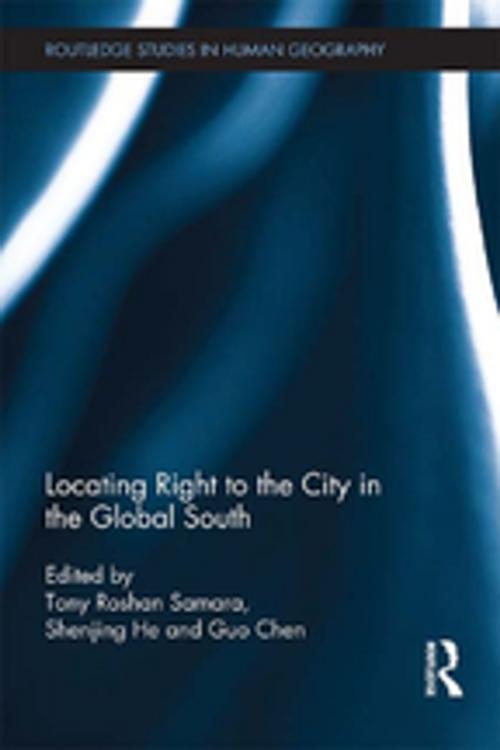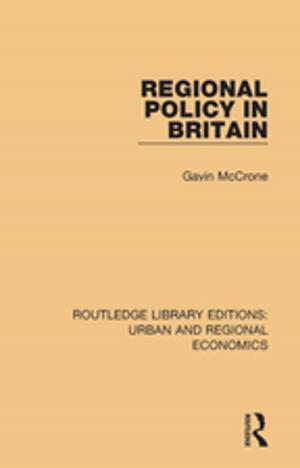Locating Right to the City in the Global South
Nonfiction, Science & Nature, Science, Earth Sciences, Geography, Social & Cultural Studies, Social Science, Human Geography, Sociology, Urban| Author: | ISBN: | 9781136201851 | |
| Publisher: | Taylor and Francis | Publication: | January 4, 2013 |
| Imprint: | Routledge | Language: | English |
| Author: | |
| ISBN: | 9781136201851 |
| Publisher: | Taylor and Francis |
| Publication: | January 4, 2013 |
| Imprint: | Routledge |
| Language: | English |
Despite the fact that virtually all urban growth is occurring, and will continue to occur, in the cities of the Global South, the conceptual tools used to study cities are distilled disproportionately from research on the highly developed cities of the Global North. With urban inequality widely recognized as central to many of the most pressing challenges facing the world, there is a need for a deeper understanding of cities of the South on their own terms.
Locating Right to the City in the Global South marks an innovative and far reaching effort to document and make sense of urban transformations across a range of cities, as well as the conflicts and struggles for social justice these are generating. The volume contains empirically rich, theoretically informed case studies focused on the social, spatial, and political dimensions of urban inequality in the Global South. Drawing from scholars with extensive fieldwork experience, this volume covers sixteen cities in fourteen countries across a belt stretching from Latin America, to Africa and the Middle East, and into Asia. Central to what binds these cities are deeply rooted, complex, and dynamic processes of social and spatial division that are being actively reproduced. These cities are not so much fracturing as they are being divided by governance practices informed by local histories and political contestation, and refracted through or infused by market based approaches to urban development. Through a close examination of these practices and resistance to them, this volume provides perspectives on neoliberalism and right to the city that advance our understanding of urbanism in the Global South.
In mapping the relationships between space, politics and populations, the volume draws attention to variations shaped by local circumstances, while simultaneously elaborating a distinctive transnational Southern urbanism. It provides indepth research on a range of practical and policy oriented issues, from housing and slum redevelopment to building democratic cities that include participation by lower income and other marginal groups. It will be of interest to students and practitioners alike studying Urban Studies, Globalization, and Development.
Despite the fact that virtually all urban growth is occurring, and will continue to occur, in the cities of the Global South, the conceptual tools used to study cities are distilled disproportionately from research on the highly developed cities of the Global North. With urban inequality widely recognized as central to many of the most pressing challenges facing the world, there is a need for a deeper understanding of cities of the South on their own terms.
Locating Right to the City in the Global South marks an innovative and far reaching effort to document and make sense of urban transformations across a range of cities, as well as the conflicts and struggles for social justice these are generating. The volume contains empirically rich, theoretically informed case studies focused on the social, spatial, and political dimensions of urban inequality in the Global South. Drawing from scholars with extensive fieldwork experience, this volume covers sixteen cities in fourteen countries across a belt stretching from Latin America, to Africa and the Middle East, and into Asia. Central to what binds these cities are deeply rooted, complex, and dynamic processes of social and spatial division that are being actively reproduced. These cities are not so much fracturing as they are being divided by governance practices informed by local histories and political contestation, and refracted through or infused by market based approaches to urban development. Through a close examination of these practices and resistance to them, this volume provides perspectives on neoliberalism and right to the city that advance our understanding of urbanism in the Global South.
In mapping the relationships between space, politics and populations, the volume draws attention to variations shaped by local circumstances, while simultaneously elaborating a distinctive transnational Southern urbanism. It provides indepth research on a range of practical and policy oriented issues, from housing and slum redevelopment to building democratic cities that include participation by lower income and other marginal groups. It will be of interest to students and practitioners alike studying Urban Studies, Globalization, and Development.















